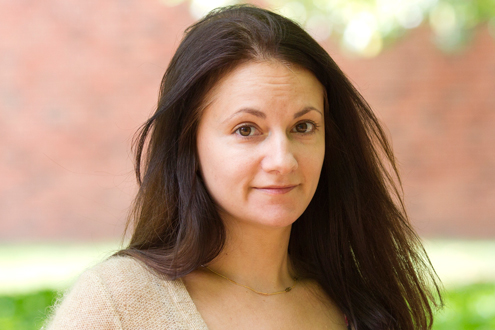
UMSL criminologist Stephanie DiPietro will receive the 2013 Gerald and Deanne Gitner Excellence in Teaching Award Sept. 26 during the annual State of the University Address at UMSL. (Photo by August Jennewein)
In just two years at the University of Missouri–St. Louis, Stephanie DiPietro has made a lasting impression on her students and colleagues.
That impact helped gain her the 2013 Gerald and Deanne Gitner Excellence in Teaching Award, which she will receive Sept. 26 during the annual State of the University Address in the J. C. Penney Building/Conference Center at UMSL.
DiPietro, assistant professor of criminology and criminal justice at UMSL, began her career at the university in August 2010 as a visiting assistant professor in the Department of Criminology and Criminal Justice.
“Early in her year as a visiting professor, it became quite clear that Stephanie took great pride and interest in her teaching and in her students,” said Finn-Aage Esbensen, the E. Desmond Lee Endowed Professor of Youth Crime and Violence at UMSL and department chair. “Students regularly stop by her office. Not just during scheduled office hours. She always makes time to meet with these students.”
Last year the department needed an additional graduate course. Esbensen said DiPietro jumped in to teach the class without hesitation.
“With only a week’s notice, she coordinated closely with the other faculty member teaching a section of grad theory and developed her syllabus and course materials,” he said. “As with her other classes, student evaluations were outstanding.”
Each year, the Gerald and Deanne Gitner Excellence in Teaching Award is given to a faculty member who is in the early stages of his or her career and demonstrates outstanding and innovative teaching abilities.
DiPietro is passionate about teaching and about giving her students the tools needed to not only learn but to question and discover on their own.
“One of my goals as an educator is to stimulate genuine enthusiasm for the key issues covered in my courses and to lay the groundwork for students to pursue their own scholarly agendas,” she said. “It is my hope that students will leave my class with a broader spectrum of knowledge than that with which they came, and the desire to carve new directions in research and policy. Although this is one of the more daunting tasks I have faced as an instructor, I feel that the easiest way to generate excitement is to be transparent with my own passion for the subject. I believe that by leading classes in lively debates and encouraging question formulation — rather than just question answering — I can help.”
And her students agree with her style. One former student commended her for her technique in the classroom.
“Her class was challenging and required constant involvement and review of class materials. She is able to provide the structure that the class needs while allowing students to comfortably involve themselves in class discussions at the same time. This was one of the few lecture classes that incorporated various presentations such as video and PowerPoint to cover course material,” the student wrote. “The different approach to the lecture allows students with different learning styles to thoroughly understand the material, and the comfortable environment encourages students to ask questions and participate in discussion.”
DiPietro’s research areas involve immigration and crime, juvenile delinquency and criminological theory. Her current research focuses on St. Louis’ Bosnian population. She also was awarded a 2013-2014 J. William Fulbright Award for the spring 2014 semester. She will conduct research and teach at the University of Sarajevo in Bosnia-Herzegovina.
“This is a tremendous honor and will be a very important part of my research,” she said. “For the past year I’ve been engaged in a study of St. Louis’ Bosnian population. My primary interest is in the younger generation, who has come of age in St. Louis and have largely defined themselves as Bosnian-Americans.”
DiPietro earned a bachelor’s degree in journalism from Emerson College in Boston, a master’s degree in sociology from The George Washington University in Washington, D.C., and a doctoral degree in criminology and criminal justice from the University of Maryland in College Park.














